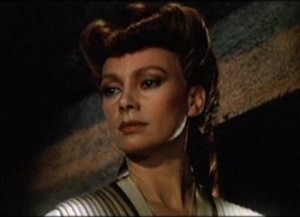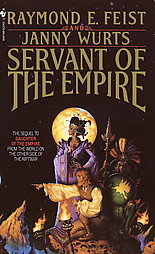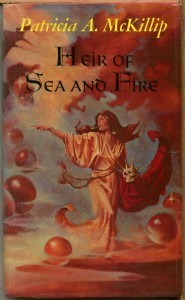Six Great Heroines of SFF: Part 2
Yesterday, May 27, I posted the first instalment (i.e. first three) of my personal Six Great Heroines of SFF: namely, Agatha Heterodyne (from Girl Genius Online), Dianora (from Tigana) and Eowyn (from The Lord of the Rings.) There's a little more background in yesterday's post, including that these are all heroines originating in books, as opposed to film or tv series—but otherwise, without more ado: Part 2!
And, drum roll:
J is for Jessica from Frank Herbert's Dune [SFF Genre: Science Fiction]

Francesca Annis as Jessica
The main character in Dune may officially be Paul Muad'dib, but his mother, the Bene Gesserit (think: political-mystical secret society; membership, women-only) Jessica, gets almost as much air time. What a character she is: strong, resourceful, smart—and one of the few women characters that I can think of in SFF who primarily
features as a mother. And Jessica is determined that her son, Paul, is going to survive despite extreme odds, even if this means that she has to deny thousands of years of the Bene Gesserit tradition to which she belongs. She plays a very active role in helping Paul survive as well, including fighting a martial arts-style duel. I still recall how much I loved Jessica as a teen reader: her vulnerability and strength, her toughness and love for her son. A mother and a mover-and-shaker at the same time: way to go, Jessica, I thought.
—
 M is for Mara of the Acoma from Raymond E Feist and Janny Wurts' Daughter of the Empire (and Empire series.) [SFF Genre: Epic/High Fantasy)
M is for Mara of the Acoma from Raymond E Feist and Janny Wurts' Daughter of the Empire (and Empire series.) [SFF Genre: Epic/High Fantasy)
In the first book in the Empire trilogy, Daughter of the Empire; in a world where women traditionally do not hold power, Mara is required by necessity to lead her clan, which through treachery has almost been annihilated, in a fight for political—and in her case actual—survival. Again, Mara is a heroine without superpowers, and with very few resouces at her command: the only way in which she can hope to survive is to out-think and out-innovate her many enemies—in a world where tradition is everything and innovation is frowned upon. Mara has to learn to play the brutal political "game of houses"—but also how to play to win without losing her humanity. Not a cost-free exercise, but Mara, like Dianora, does remain true to herself. She also survives—but it's mainly because of her smarts and courage, coupled with her humanity, that Mara of the Acoma will always be one of my great heroines of SFF.
—
 R is for Raederle from Patricia McKillip's Heir of Sea and Fire, the second in her "Riddlemaster of Hed" (or alternately, "Riddlemaster of Stars") trilogy. [SFF Genre: Epic/High Fantasy)
R is for Raederle from Patricia McKillip's Heir of Sea and Fire, the second in her "Riddlemaster of Hed" (or alternately, "Riddlemaster of Stars") trilogy. [SFF Genre: Epic/High Fantasy)
In a "Six of" series like this, the last choice is always the hardest to make. There are always so many choices clamoring at you for that last spot—and in fact most of them would be highly deserving of a spot. I think we all know that there aren't just six great heroines of SFF: that their numbers are legion. But six was the number I set myself, so hey, I had to choose. So why did I choose Raederle?
Firstly, I reviewed the previous 5 heroines and realised that I didn't have a mage—or anything like a mage for that matter. (Tsk!) And in fact, 3 out of my current 5 (Dianora, Jessica and Mara) are pretty much ordinary gals, i.e. no prowess with either sword or magic. (What was I thinking?) But in fact regardless of magery, Raederle has been one of my favourite SFF characters for a long time. So why is that?
Well, back in the day when I first read The Riddlemaster of Hed, SFF was mainly about boys, right? (OK, I was very young, but still … I'm telling it the way I found it, picking books from the library shelves.) Riddlemaster was no exception, but I sill loved it. It ended on a cliffhanger, too, so I was longing for the next book. But for some reason, the next book took a very long time to arrive where I was living. So it was almost five years later when I finally saw Heir of Sea and Fire in the library catalogue and promptly reserved it.
And then, when I opened up the book, it wasn't even about Morgon, the eponymous Riddlemaster. But I wasn't disappointed, because the story turned out to be about Raederle, who'd only been this background figure in the first book—and she was like, you know, a chick, but instead of waiting around the for the man she was interested in to come to her, she set out to find him. (He had gone missing, you see, which made the finding part important.) And along the way she had adventures, and met other interesting young women who were also about getting out there and doing stuff, and not about sitting around at home waiting for life to find them. Oh yes, and Raederle also found out that she had superpowers—and not just small, parlour trick magic, but the real deal: the big stuff. She finds out that she is more than awizard even, she is something greater: magic personnified, as it were.
So as a young but already avid SFF reader, Heir of Sea and Fire was a watershed work for me: one where the woman and her journey were the centre of the book, not confined to the periphery, and one in which the woman had power, but also integrity, honor and courage—i.e. a very far cry from the "weak as women's magic" and "wicked as women's magic" that had shocked and alienated me so much in A Wizard of Earthsea (much as I otherwise loved the book.)
Two other aspects of Raederle's story particularly spoke to me: one was that, although her power initially frightened her—for good reasons—she had to learn to understand, accept and embrace it, rather than giving it up (i.e. she's no Arwen.) The second was the genuine friendship, camaraderie and friendship between the women in the story, which resonated with my own experience of the world, rather than those stories where women are always competitive, backstabbing and manipulative (e.g. the sort of relationships that I discussed in relation to Robert Jordan's Wheel of Time series, here.)
So there it is—or rather, here they are, six of my great heroines found within the covers of SFF:
Agatha Heterodyne (Girl Genius)
Dianora (Tigana)
Eowyn (The Lord of the Rings)
Jessica (Dune)
Mara of the Acoma (the Empire series)
Raederle (Heir of Sea and Fire: The Riddlemaster of Hed series)
All these heroines are drawn from those I found inspirational in my SFF reading and formative in terms of my own writing aspirations. But there are so many more—and just in case you thought I was just being diplomatic about that "almost" list, here's a few that could very easily have had a spot (I hope in alphabetical order):
Alanna (Tamora Pierce's "Lioness" series)
Amat Kyaan (Daniel Abraham's Shadow In Summer
Hari/Angharad (Robin McKinley's The Blue Sword)
Jame from PC Hodgell's Godstalk
Katniss from Suzanne Collins' The Hunger Games;
Lyra Belacqua from Philip Pullman's The Golden Compass;
The two Morgaines:
CJ Cherryh's Morgaine in The Chronicles of Morgaine; and
Marion Bradley's Morgaine in The Mists of Avalon
Peri, from Patricia McKillip's The Changeling Sea
Signy Mallory and Elene Quen from CJ Cherryh's Downbelow Station;
Samiha from Mary Victoria's Samiha's Song
Tattersail from Steven Erikson's Gardens of the Moon.
And many more …
So how about you? Who's not on this list that you think definitely should be? 



